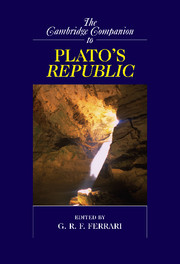Book contents
- Frontmatter
- 1 The Protreptic Rhetoric of the Republic
- 2 The Place of the Republic in Plato’s Political Thought
- 3 Rewriting the Poets in Plato’s Characters
- 4 Wise Guys and Smart Alecks in Republic 1 and 2
- 5 Justice and Virtue: The Republic’s Inquiry into Proper Difference
- 6 The Noble Lie
- 7 The Three-Part Soul
- 8 Eros in the Republic
- 9 The Utopian Character of Plato’s Ideal City
- 10 Philosophy, the Forms, and the Art of Ruling
- 11 Sun and Line: The Role of the Good
- 12 Beginning the “Longer Way”
- 13 The City-Soul Analogy
- 14 The Unhappy Tyrant and the Craft of Inner Rule
- 15 What Is Imitative Poetry and Why Is It Bad?
- 16 The Life-and-Death Journey of the Soul: Interpreting the Myth of Er
- Bibliography
- Index of Passages
- Index of Names and Subjects
- Series List
7 - The Three-Part Soul
Published online by Cambridge University Press: 28 November 2007
- Frontmatter
- 1 The Protreptic Rhetoric of the Republic
- 2 The Place of the Republic in Plato’s Political Thought
- 3 Rewriting the Poets in Plato’s Characters
- 4 Wise Guys and Smart Alecks in Republic 1 and 2
- 5 Justice and Virtue: The Republic’s Inquiry into Proper Difference
- 6 The Noble Lie
- 7 The Three-Part Soul
- 8 Eros in the Republic
- 9 The Utopian Character of Plato’s Ideal City
- 10 Philosophy, the Forms, and the Art of Ruling
- 11 Sun and Line: The Role of the Good
- 12 Beginning the “Longer Way”
- 13 The City-Soul Analogy
- 14 The Unhappy Tyrant and the Craft of Inner Rule
- 15 What Is Imitative Poetry and Why Is It Bad?
- 16 The Life-and-Death Journey of the Soul: Interpreting the Myth of Er
- Bibliography
- Index of Passages
- Index of Names and Subjects
- Series List
Summary
A full picture of the human soul emerges only gradually from the Republic. In Book 4 we come first upon a conventional enough distinction between calculation and desire, which under pressure from the correspondence between the microcosm of the just individual and the macrocosm of the just society, with its three different classes, is complicated by the addition of a third element, the element of “high spirit” (thumos). At this stage the three elements in the soul are distinguished principally by their functions: calculation calculates, desire desires, spirit gets spirited. If the text is pressed to assign them an object or goal as well as an activity, the indications would be that calculation is concerned with the good (i.e., with the best course of action); desire is concerned with pleasure; while spirit reacts to perceived slights or wrongs.
When we revisit these three elements in Books 8 and 9, however, they have taken on a different look. In Book 4 they seemed most like faculties; now they seem more like drives. The desiring element is specified as the drive toward material satisfaction; spirit as the drive to win and to amount to something; calculation as the drive to discover truth. They have not shed their characteristic functions, but these have found a new context; and the biggest change is to the calculative element. Previously, it had been unclear whether this element even had a goal of its own or was merely a supervisor that placed limits on the interests of the other elements in the interest of the individual as a whole. Now it is assigned an object of desire all its own, and that object is not the good, whether the good of the individual or the good tout court, but wisdom. Wisdom is a good, of course, arguably the highest good.
- Type
- Chapter
- Information
- The Cambridge Companion to Plato's Republic , pp. 165 - 201Publisher: Cambridge University PressPrint publication year: 2007
- 28
- Cited by

